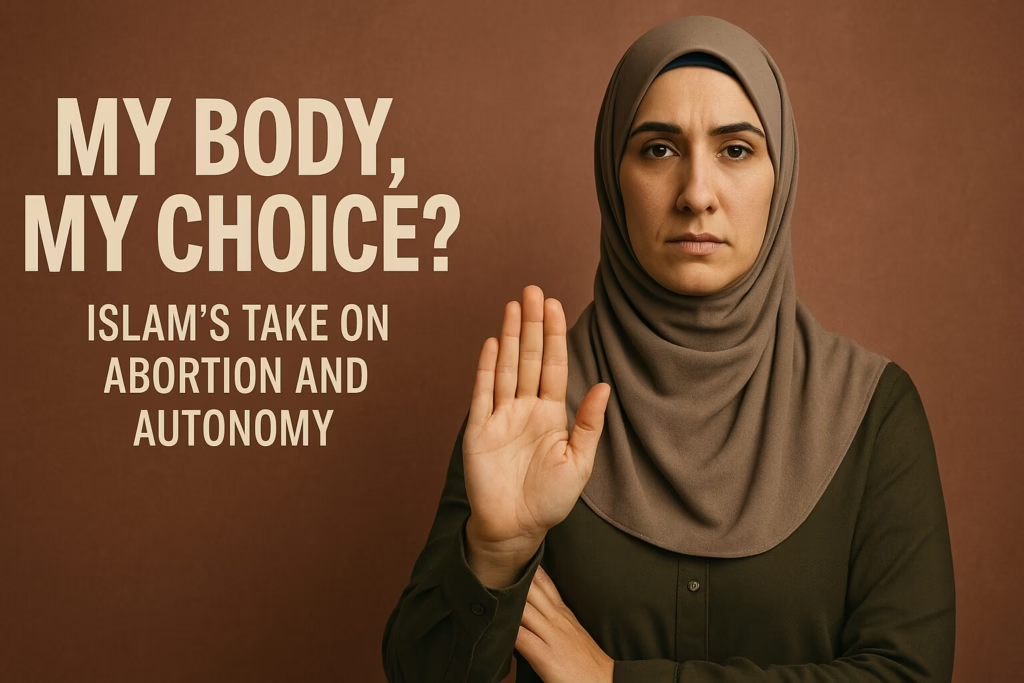- 1: My Body, My Choice?” — Islam & Abortion
It’s the rallying cry of reproductive rights across the West: “My body, my choice.” But where does Islam stand on the topic of abortion, bodily autonomy, and the right to choose?
Disclaimer:
This post tackles a sensitive subject. Interpretations on abortion in Islam vary across different scholars and madhāhib (schools of thought). This article is a general overview and should not be used as a fatwa. Women facing personal circumstances should consult a qualified Islamic scholar.
The Western Debate at a Glance
In many Western nations, abortion is framed as a woman’s right to bodily autonomy. The discussion often centers on privacy, self-determination, and medical freedom.
But this “freedom to choose” is deeply polarizing—between pro-choice and pro-life advocates—especially after Roe v. Wade was overturned in the U.S.
Islam doesn’t quite fit into either camp. It takes a middle road, one that recognizes both the sanctity of life and the complexity of real-life hardships.
Islam’s Core Values on Life and Creation
The Qur’an is clear:
“Do not kill your children for fear of poverty. We provide for them and for you. Surely, killing them is a heinous sin.”
(Surah Al-Isra 17:31)
In Islam, life is sacred—whether in the womb or outside of it. But there’s more nuance than just a flat “haram” or “halal” verdict.
The 120-Day Rule: When Does Life Begin?
According to a famous hadith from Sahih Bukhari, the Prophet Muhammad ﷺ said:
“The creation of each one of you is brought together in his mother’s womb for forty days as a drop (nutfah), then a clot (‘alaqah) for a similar period, then a lump of flesh (mudghah) for a similar period. Then the angel is sent and breathes the soul (ruh) into him…”
(Bukhari, 3208; Muslim, 2643)
Scholars interpret this to mean:
- First 120 days (approx. 17 weeks): Abortion may be permitted under specific, dire conditions (e.g. rape, severe fetal abnormalities).
- After 120 days: Abortion is only permitted if the mother’s life is in danger.
Real-Life Examples: Between Mercy and Law
Case 1: Rape Victims in War Zones
Fatwas from scholars like Sheikh Yusuf al-Qaradawi and bodies like Dar al-Ifta al-Misriyyah have permitted abortion for rape victims within the first 120 days, particularly in war contexts (e.g. Bosnia, Iraq, Palestine).
📌 This is based on “darurah” (necessity), a key principle in Islamic jurisprudence.
Case 2: Fetal Deformity
Some contemporary scholars allow abortion in cases of severe fetal impairment, if confirmed by qualified medical specialists before 120 days. The aim is to prevent emotional and economic hardship, which Islamic law considers.
Balancing Rights: The Mother, the Child, and the Creator
Islam doesn’t view a woman’s body as a battleground of control—but as a trust (amānah) from Allah.
A woman is not a vessel for reproduction; she’s a spiritual being whose pain, hardship, and dignity matter deeply in Islamic law.
But once the soul (ruh) is believed to have entered the fetus, the unborn child gains rights too—especially the right to life.
This creates a moral balance:
- Islam values bodily autonomy, but within the framework of divine ethics.
- Islam empathizes, but doesn’t liberalize life to the point of treating it casually.
What Islam Offers That Secular Systems Often Don’t
Instead of:
- Framing abortion as empowerment
- Or criminalizing women without empathy
Islam gives a tiered moral system:
- Discouraged in general
- Permissible under hardship before 120 days
- Prohibited after 120 days, unless the mother’s life is at risk
It also offers:
- Spiritual remedies, like repentance (tawbah) and prayer
- Moral clarity—not just personal choice, but divine accountability
- Support for women, financially and emotionally, through zakat and family
Islamic Role Models: Women Who Chose with Taqwa
- Maryam (AS) bore a child against all odds, mocked by her people, but chose trust in Allah.
- Umm Sulaym (RA) lost her child and showed patience, inspiring even the Prophet ﷺ.
While these are not abortion stories, they reflect how faith, struggle, and maternal choices are intertwined in Islam—not trivialized.
Conclusion: More Than Just a Hashtag
Islam doesn’t chant “My Body, My Choice.”
It says: “Your body is a trust. And every choice echoes in the Hereafter.”
But it also says:
“Allah is the Most Merciful, and He understands what you’re going through.”

